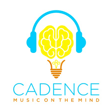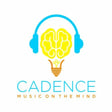Become a Creator today!Start creating today - Share your story with the world!
Start for free
00:00:00
00:00:01

S04 Episode 01: JJJJerome Ellis
This episode, composer and musician Jerome Ellis tells the story of how his stutter has informed his journey as an artist, and how he explores blackness, disability, divinity, nature, sound and time in his work.
Cadence is the podcast where we talk about what music can tell us about the mind. Hosted by neuroscientist and musician, Dr. Indre Viskontas, the fourth season will bring you the stories of people who experience music outside the bounds of the average listener, and who use music as a tool to be heard in a society in which they are often ignored.
Transcript
Mysticism and Silence: Union with the Divine
00:00:00
Speaker
I read the writings of different mystics and they'll talk about these experiences that they have of union and oneness and leaving the body and yeah, a certain kind of connection with God or the divine and those moments. I feel a great resonance with that because that's often how it feels to me. And to me, part of it is that there's a strong sense of silence because in those
00:00:25
Speaker
Mystical writing, silence often plays a very strong role that they'll say like, suddenly I saw a great light and all sound faded away.
Jerome Ellis: Music and Stuttering
00:00:38
Speaker
Jerome Ellis is a composer who plays many instruments. He also stutters. I mean, again, there's like struggle and pain, but also in like playing the piano, I feel that I'm a vessel for the music that is like a river.
00:00:54
Speaker
high up in a mountain and that I'm just the river banks and that the piano is the Delta letting the water out into the ocean. There's a feeling that I have similarly when I'm studying that. To me, it's a supremely musical thing and that the music happens to be silence, but it feels like in those moments also, I'm an instrument.
Music Therapy and Its Impact
00:01:26
Speaker
Welcome back to Cadence, the podcast where we talk about what music can tell us about the mind. I'm Andrei Viscontis. In this fourth season, we're going to bring you the stories of people who experience music outside the bounds of the average listener and who use music as a tool to be heard in a society in which they're often ignored.
00:01:50
Speaker
We're going to intersperse episodes featuring these stories with a nuts and bolts guide to how music therapy can help people with different health issues, featuring pioneering music therapist, the legendary Dr. Connie Tommeno. We hope that by the end of the season, you'll have a better understanding of how music can be used to make us and our society better.
Rethinking Time Through Performance
00:02:15
Speaker
I often listen to podcasts when I go for runs, and I distinctly remember exactly where I was in San Francisco's Golden Gate Park when I first heard Jerome Ellis on this American Life's 713th episode. The segment was called Time Banded because he stole time during a poetry slam in Manhattan. At the marathon event, each speaker was strictly allotted only three minutes, not a second more. But Jerome took five.
00:02:45
Speaker
And just like I imagine was the case for the members of the audience that day, listening to that segment made me completely reconsider my relationship with time as I stopped my run mid stride and opened up my notes app.
Identity Exploration: Blackness, Disability, and Time
00:03:00
Speaker
Jerome was born in 1989 to Jamaican and Grenadian immigrants, and he lives in Virginia. His work includes contemplative soundscapes using saxophone, flute, dulcimer, electronics and vocals, scores for plays and podcasts, albums combining spoken word with ambient and jazz textures, theatrical explorations involving live music and storytelling, and music video poems that seek to transfigure historical archives.
00:03:28
Speaker
Through his work, he explores blackness, disability, divinity, nature, sound, and time. When did I know that I had trouble speaking? I feel like it may not have been until I entered school and preschool.
00:03:51
Speaker
or kindergarten around the age of four or five.
Stuttering Awareness and Perception
00:03:53
Speaker
But I don't know and I find that really interesting because I think it immediately brings the question, not only like when did I learn that I had trouble speaking, but when did I learn that the specific way that I speak is considered to be pathological.
00:04:14
Speaker
Around the age of four, kids begin to understand that they're separate entities from others. They develop what's called a theory of mind. That they, and those around them, have unique minds with individual intentions, beliefs, feelings, and thoughts.
00:04:32
Speaker
It seems obvious to us as adults, but developing a theory of mind takes time and experience. And sometimes you can even see this unfold in real time if you talk to preschoolers. It's around this time then too, that kids begin to recognize what's similar and how they might be different.
00:04:54
Speaker
The truth is, what is normal and abnormal is somewhat arbitrary. We shy away from those terms now because they unfairly stigmatize people whose brains are outside the average. Once I started going to school and started interacting with people outside of my family, then I probably started noticing, you know,
Theory of Mind Development
00:05:19
Speaker
Because my mother, she has a stutter. And so if what the first language that I heard and imbibed was a stuttering tongue, then was there a point in my life when I considered that to be normal? When we're children, we develop mental models about how the world works from our experiences.
00:05:45
Speaker
For example, if there is an object that occludes another one, we make the assumption that the object that we can see in full is in front of the one that's partially occluded. These models help us navigate complexity by allowing us to take useful shortcuts. We make assumptions based on a little bit of information, and often, in the case of occlusion, those assumptions serve us well.
00:06:12
Speaker
But of course, there are also assumptions that are sometimes wrong.
Language and Identity: 'Father Tongue' and 'Mother Tongue'
00:06:18
Speaker
There's a poet named M. Nor Bessie Philip, and she writes about English being her father tongue. And she's black and a member of the African...
00:06:42
Speaker
African diaspora and someone else who inherited English and who has no sense of what African language or languages my ancestors spoke. You know, I think of English as my father tongue too, and it feels to me like the stutter is in some ways my mother tongue, not only because I literally inherited from my mother, but also because it holds space for
00:07:11
Speaker
a certain kind of silence that to me on one level is related to the silence of the African languages that I don't speak and that I don't know which ones my ancestors spoke.
00:07:29
Speaker
This idea that silence is ingrained into a language was new to me and made me think about the musical tempo of a language, what those silences might mean in different tongues, and how, despite the fact that we're becoming more and more a global society, there are so many nuances in language that we might not grasp when we're trying to communicate.
00:07:52
Speaker
the silence is a part of my name, that my name is not Jerome, it's not J-E-R-O-M-E, but as I've been spelling it more lately, is J-J-J-J-J-E-R-O-M-E. And the five J's are a way to point to the fact that the silence is a part of my name.
Stuttering as Divine: Identity and Faith
00:08:13
Speaker
Standardize, you know, language doesn't reflect that experience.
00:08:20
Speaker
How we identify with our names is fascinating. And here is a person whose name isn't just a particular pronunciation of phonemes, but one that has a rhythm, too. It's important for me to honor the stutter. For me, there's a dimension to it that feels very religious or devotional, that the stutter feels like
00:08:48
Speaker
a divine being that when it arrives that I need to honor it and pay its reverence and respect.
Scientific Perspectives on Stuttering
00:08:56
Speaker
And to me, there's a level on which my name feels like an offering that I offer to it. I think about this story in the Bible where Jacob, this man Jacob, he wrestles with an angel. And in the end, I think the angel asks Jacob what his name is.
00:09:17
Speaker
when I'm studying my name, it feels like a wrestling match with an angel that then I then say the name afterwards. We still don't fully understand the brain basis of stuttering. For a long time, scientists looked for clues in the vocal apparatus itself, in the muscles and the parts of the body involved in speech. But neuroimaging advances over the last 20 years or so have shown that stuttering often starts in the brain.
00:09:44
Speaker
Stuttering is more common than you might think, affecting about 5% of the population, and most people who stutter don't have any history of brain injury, nor is it associated with cognitive deficits, other language difficulties, or psychiatric problems. Many stutters develop the condition in childhood, and the majority of them grow out of it. Why it persists in about 20% of the kids who stutter? We just don't know yet.
00:10:15
Speaker
But there's some evidence that a specific white matter tract, the projections of neurons between two regions in the brain associated with language function, might be different in people who stutter compared to what it's like in people who don't.
00:10:31
Speaker
This tract is called the arcuate fasciculus, and we've actually talked about it before on this podcast, because it's the highway that joins the language comprehension regions in the brain with the speech production regions. So when you hear what someone is saying, and then are preparing a reply, information needs to be conveyed along this tract.
00:10:55
Speaker
In most of us, it's like a huge eight-lane highway on the left side, where much of our language function is localized. There's a complimentary tract on the right, but if you're not a musician, it's more like a small country road.
00:11:09
Speaker
Musical training, though, seems to thicken the right-sided tract, as musicians have to learn to turn the sounds in their head into sounds coming from their instruments or bodies, much in the same way that we need to turn the sentences in our minds into ones that come out of our mouths.
Brain Variations in Stuttering
00:11:30
Speaker
Melodic intonation therapy, a powerful type of music therapy that uses the fact that people whose language areas on the left side have been damaged by stroke or injury, can repurpose similar areas on the right side so that they can sing what they can't say. And when this therapy is successful, we see a thickening of the arcuate fasciculus on the right side, just like we do in highly trained musicians.
00:12:01
Speaker
So this white matter tract, this highway on the left, seems to be different in stutterers. But there are other measurable differences in other language regions too, depending on the individual. Sometimes the areas showing differences are responsible for speech planning.
Stuttering as Musical Expression
00:12:18
Speaker
Sometimes they're primarily motor regions. Sometimes we see a timing issue in terms of how synchronized the neurons in these regions are to one another.
00:12:29
Speaker
But there's a lot of heterogeneity among those who are affected. And so my body, you know, I feel a tightness in my chest often. I usually stop breathing, and it's really hard to get myself to start breathing again. When we talk about brain regions and white matter tracts, this clinical approach makes it easy to forget that there are feelings involved too.
00:12:58
Speaker
that when we want to say something or do something and our body betrays us to a certain extent, it can be literally discombobulating. It feels like a wrench gets thrown into the gears of my body and everything just sort of freezes. But how we express ourselves is also very closely tied to our sense of self, of who we are, of our identity.
00:13:29
Speaker
I read the writings of different mystics and they'll talk about these experiences that they have of union and oneness and leaving the body and connection with God or the divine and those moments. And to me, part of it is that there's a strong sense of silence because in those
00:13:51
Speaker
Mystical writing, silence often plays a very heavy, a very strong role that they'll say like, oh, suddenly I saw a great light and all sound faded away. When I'm playing an instrument, like I'm playing the piano, I feel that I'm a vessel for the music that is like a river high up in a mountain and that I'm just the river banks and that the piano
00:14:21
Speaker
is the delta letting the water out into the ocean. There's a feeling that I have similarly when I'm studying that. To me, it's a supremely musical thing. The music happens to be silence.
Jazz Improvisation and Unique Rhythms
00:14:39
Speaker
I was captivated by Jerome's description of being a vessel for music and how he's the riverbank letting the instrument flow out into the ocean. I wanted to learn more about how it feels and how he got to this place. Like I think a lot about like the, the force involved in playing instruments, like the banging on the piano and, and I play, I play, play, I play,
00:15:09
Speaker
hammer dulcimer into this, you know, hammering motions. And when I play saxophone, I, you know, I'm striking keys. So to me, the tension in my chest and the tension in my body and the lack of breathing to me feels also like an instrumental thing.
00:15:29
Speaker
When Jerome was in fourth grade, he was part of a group of six or seven kids who traveled around the city and the state and competed in improvised storytelling competitions. They would go up on stage, be given a prompt, and then they would just make up stories. And that was the first art form I engaged with. And I absolutely loved it.
00:15:55
Speaker
I remember thinking like, oh, I really love like being on stage and we love theater. Like maybe I would like to be an actor. And I remember like really feeling like, oh, but I can't be an actor. How because I have a stutter, that's not a viable path for me. So the next year he picked up the violin and liked it, but he didn't feel that it was necessarily the right instrument for him. A few years later though, Jerome would stumble upon something new.
00:16:24
Speaker
And I had very recently started listening to jazz and had noted the role that the saxophone played in a lot of the jazz I was listening to. And I took to that quite immediately. And what I immediately found so freeing about jazz was improvisation as a practice.
00:16:53
Speaker
And now, many years later, Jerome can see the ties between his affinity for improvising and his stutter. In retrospect, you know, I think a lot about the ways that improvisation was very freeing for me in relationship with my stutter because I often feel as a stutter is that I can't adhere to the rhythms and meters that are set
00:17:18
Speaker
in conversation. When improvising, I would put on Miles Davis CDs at home and I would play over them and there was such a feeling of like, well, I can play the same rhythm that he's playing or I can play something different or I can play whatever I want. But how does it feel to stutter on a saxophone?
Stuttering and Instrumental Performance
00:17:40
Speaker
There are plosives and dentals in speech, Ds, Ps,
00:17:48
Speaker
Bs and Ts, often I stutter on those sounds. When I'm blocking or stuttering on the saxophone, it often feels the way that it does when I'm trying to say a D or a T or a P or a B. And there's a very specific kind of tension that arises in my body when I'm trying to say those letters as opposed to if I'm stuttering on an M. But also with the saxophone, there's something about
00:18:21
Speaker
articulation, you know, I play the flute too, and I haven't been playing the flute for nearly as long, but I find on the flute that I stutter much less because the articulation, the way you articulate on them is different. And the embouchure, the band director
00:18:43
Speaker
Mr. Boyd, he himself is a saxophone player and he would teach me a lot about how to articulate on the saxophone. He would say like, you use a very tip of the tongue and if there were passage in the music that was staccato, I would often have trouble with that. Especially if I had to play it solo.
00:19:09
Speaker
And then in 10th grade, Jerome started experimenting with the piano. I would play it very late at night with my headphones plugged into it. And I eventually just started like writing little melodies on it. And it was the first time I had
00:19:34
Speaker
had composed. And I felt a different sense of freedom there that it was like, well, you know, with these Miles Davis records, I still have to adhere in some ways to the harmony and the chord changes.
Healing Through Composition and Rubato
00:19:50
Speaker
But here it's like, I can just make it all up myself. And I remember that being so powerful. But it took me many years to realize
00:20:02
Speaker
that I wanted to be a composer, not just in addition to being an instrumentalist. And in my composing, it's become such a laboratory for
00:20:26
Speaker
time and temporal accessibility and listening. It's like in my music, I can heal myself in so many ways from many wounds, many time-based wounds I've experienced in my life, from having a stutter.
00:20:45
Speaker
reimagining my relationship with time and forming new relationships with time. Like a vast swath of my music has no meter. It's just like some might call some pieces ambient or soundscapes, but for me also, it's just like I practice extreme rubato in a lot of my music.
00:21:13
Speaker
In music, rubato indicates when a performer can stretch or compact the meter of a piece to their own liking. Rubato itself is so, is so healing for me. You know, it's like when I'm studying to me, that is a form of rubato that you, in your listening, you allowed to
Music, Stuttering, and Identity in America
00:21:42
Speaker
occur, but not everybody does that. Sometimes I'm studying my name, some people will just move on. If I don't like a party or something, they'll just turn around or something. Then the music doesn't get to exist and it's very painful. So I feel like my whole life I will be talking about relationship between music and studying
00:22:09
Speaker
Before talking to Jerome, I thought that his story would be one similar to patients with Parkinson's disease, where their symptoms essentially disappear when they're doing something they love, like Michael J. Fox when he skates, or others I've met when they're dancing or playing music.
00:22:27
Speaker
But that's not really the case with Jerome. Because it's something he's lived with since he was a child, something so closely tied to how he's formed his identity, it's not so cut and dry.
Historical Performances and Facades
00:22:40
Speaker
In fact, Jerome puts forth the idea that music, stuttering, and identity are all deeply interrelated, not just on a personal level, but on a societal level as well.
00:22:52
Speaker
In our conversation, this idea was raised particularly as it pertained to blackness in America, a history that, as Jerome points out, is one in which black people have been repeatedly cut off and denied a voice. So there's this book that for me has been foundational in the past year. It has scenes of subjection by Sadia Hartman.
00:23:22
Speaker
There's this part in chapter one where she is talking about the practice of the coughle when slaves were being taken to the auction block and they were chained, chained
00:23:47
Speaker
together, they were very often forced to sing and to dance and to play instruments like a fiddle or banjo or drum. And the very explicit goal, as you'll read in many writings, the goal was to make the slaves look happy, happy with their
00:24:08
Speaker
with their lot, their fate. And to support this idea that was very common at the time and which is an idea that has still not gone away, which is that black people are inherently content, inherently joyful, inherently musical, inherently rhythmic, inherently they don't feel pain as much. And so, you know, they were forced
00:24:38
Speaker
to make music. And for me, when I think about jazz and Black music in general and time, that to me is a foundational scene. Hartman talks about, she uses this phrase, the opacity of Black song, that opacity and
Resisting Norms: Stuttering's Value
00:25:06
Speaker
and concealment is it must be considered itself a form of resistance and escape from being understood. There is a TED talk by the black feminist scholar, Brittany Cooper called the racial politics of time. And she,
00:25:37
Speaker
She talks about this, the ways that, as she very simply puts it, white people own time, where time is a field of subjugation. And there are many examples of this where slaves would
00:26:01
Speaker
would act like they don't know what time it was or act like they don't know how to tell time or that they couldn't remember how to tell time. To me, jazz is related to that, that there are some jazz albums and it's just three nine-minute tracks and there's some that are one half-hour long track. I remember being so moved by those when I was in middle school and learning so much about this music. Also, part of the impetus behind Bebop was
00:26:30
Speaker
We don't want to make music that white people can dance to. We want to explore something else. And the tempos that they would explore and be by. To me, again, there's so much resistance happening there that, again, is so integrated with, is so interwoven with time. I think stuttering
00:26:57
Speaker
If you look at the history of how it has been pathologized, there is a scholar named Joshua St. Pierre who writes a lot about this. And he looks at the intertwining between the way stuttering has been interpreted and pathologized and treated. The intertwining of that and the history
00:27:30
Speaker
of capitalism. Capitalism, of course, is inseparable from racial slavery. So as these forces and systems and structures developed, the idea of time as money had a direct influence on how speech is interpreted. And to me,
00:27:58
Speaker
One of the reasons why in this time, why people who stutter are interpreted and seen in certain ways and pathologize has to do with that ideology that because you take a certain amount of time to do something that that's inefficient or is a waste or something that needs to be fixed so that you can speak more fluently.
00:28:28
Speaker
One of the things that stutters about as a force, for me, is it resists smoothness, it resists fluency, and it resists linearity.
Active Listening and Challenging Ideals
00:28:42
Speaker
And it reminds me and it reminds us of the value and the necessity of pausing.
00:28:56
Speaker
of listening and also of the fragility of communication, how in order to communicate with someone who stutters, the non-studderer has to cultivate certain habits and practices
00:29:24
Speaker
of listening that are in some ways antithetical to mainstream practices, that again, play such an emphasis on efficiency, speed, smoothness, and transparency. And for me, there's so much value also in listening and waiting, and waiting not as a passive thing.
00:29:53
Speaker
but waiting as an active thing, listening, slowing down, resting, all these things.
Music as a Voice for the Ignored
00:30:09
Speaker
I want to give Jerome the last word here, but I also want to tell you about the rest of this season of Cadence. We're telling the stories of people who experience music differently than the rest of us.
00:30:21
Speaker
Those who use music as a form not only of expression, but of communication, of a way to be heard by a society that ignores or outright silences them. And how music can help us get better. The nuts and bolts of music therapy with the legendary Connie Tommeno. Not just as individuals, but as a society too. Stay with us. Yeah, and unknowing, you know, I think is also important.
00:30:52
Speaker
I think that's another thing that many white people and whiteness, again, as an ideology, I think could use more of a sense of unknowing and respect for what they don't know and in the space of unknowing to listen. When I'm studying on the phone and somebody doesn't know what's going on, you know, I'll call
00:31:21
Speaker
a bookstore and I'll ask them if they have a certain book and they ask me the title and then I start stuttering. It's like if you wait seven seconds and hang up, you wait 13 seconds and hang up and you wait a whole 60 seconds and then you hear me say the title of the book. The practice of listening that is engaged in that third example to me is what that practice speaks to is
00:31:47
Speaker
There's something is I don't know what's happening. It may be that the phone line has dropped, but I don't know that. And I'm going to sit and sit in that unknowing rather than the first person who assumes after seven seconds that they know, you know,
00:32:09
Speaker
how that the phone line has dropped. And of course, I sometimes do on the phone tell them like, oh, I'll tell them right at the top of the call, like, hi, I have a stutter. So if I stop talking, then it's the phone, you know, and that's cool
Podcast Credits and Contact Information
00:32:21
Speaker
too. But I also like to engage as I did in the performance that I specifically didn't reveal that I have a stutter until partially through the performance because I wanted to place the audience in that space.
00:32:37
Speaker
of unknowing and sitting in the unknowing.
00:32:56
Speaker
Season 4 of Cadence is created by me, Dr. Andre Viscontes. It is produced by Ireland Meacham and Matthew Rubinstein at Audiation. It is mixed by Matt Noble with music from Rhian Sheehan from his album Stories from Elsewhere. Except for this episode, where all the music except for this very last track was composed by Jerome Ellis.
00:33:18
Speaker
You can find us online at cadence.show. You can also get in touch with us at cadencemind at gmail.com. You can find me on Twitter at Andre This. Cadence is generously supported by the Germanicos Foundation. Audiation.














